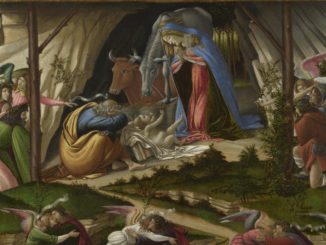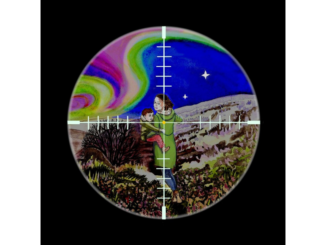
Inspector Angela Griffiths took the call from another officer, who muttered, “Another weird one, but it might be related?”
It was the Churchwarden of the church in the village of the missing man, Doctor David Kingsbridge, “I’m sorry to bother you with this, but given you’re looking into Doctor Kingsbridge’s disappearance, I thought you should know that his wife’s grave was dug up sometime last night and her coffin’s gone. No one here saw anything. It’s awful, like some evil curse has fallen…”
The woman was in tears, she gave her time to re-gather herself. “Thank you for letting me know, we’ll be over shortly, can I have your number and meet you there?”
She put the phone down, the doctor’s disappearance was odd, but many of his clothes had gone, and his bank accounts were untouched, so had not been made a high priority. This would make it one though, very creepy… They would need a closer forensic examination of his house and the churchyard for sure.
They were in the Counter Terrorism Command’s main conference room, the chief, senior officers, Andy Bowson himself, other colleagues and a couple of forensics experts. They had apparently worked through the weekend on the materials recovered from the hide in the Chilterns, a few human hairs, done the DNA analysis, had a good match against police records from seven years ago. A Matthew David Williams, English-Welsh Caucasian, educated in Bristol, twenty-three, arrested a couple of times for petty crime, no convictions though, apparently just another troubled homeless youth, then nothing for the last five years.
“We need to find him, talk to the people who know him, where he’s been, how he could pick up the skills to kill over thirty heavily armed terrorists. Andy, can you pick this up? The Bristol force will help, someone else will take on the missing civil servant case; we’ll get you three or four other officers from the Command, some uniformed bods as well, this is second only to rolling up the fanatics. Thank you.”
He picked up the details; they had kept this very quiet over the weekend, must have wanted to be sure of the identification before spreading it wider. Why me, perhaps because they think that I’ve the extra incentive, was he one of the masked men in that house in Birmingham?
Can’t tell, it’s never dull around here these days. I wonder how Henry, no, John, is doing? If I ever get a minute, I’ll get in touch.
Abbot Winwaloe, along with the rest of the High Council, bade farewell to the envoys after lunch and walked with them down to the quay where a fleet of fishing smacks and gigs were unloading the last of the goods from the ship that had brought them, which was now waiting off-shore, just beyond the barrier. The cargo now being delivered had been unloaded last night onto the smaller native vessels; he saw it was mainly trade goods for Logres, other supplies, foods, construction materials, medicines, clothing, tobacco and cigarettes. The more sensitive imports, weapons, military supplies, money, gold and silver, antiquities, had been unloaded immediately on the envoy’s arrival and were now either in the town arsenal or in the Duke’s fort.
They had been staggered by what had been unloaded, far more than ever before, with more on its way in the next few weeks, before the nights got too short. The Exarch and their allies were serious then, had asked them to build a training barracks and camp for two hundred volunteers immediately. In some ways he was glad to see them leave, to allow us time to digest it all, make sure we were not just being swept along. He blessed their departing gig and headed back to the Town Hall with the rest of the Council, questioning himself more fiercely than ever.
The private ambulance pulled up outside her house just before three; she was waiting and opened the front door, wedging it wide, her smile of welcome even wider. He had been wheeled in feeling like a complete fool. Looking around he was pretty sure some plain clothes security had him in view; there, a fit looking female pedestrian, almost certainly wired to a vehicle around a nearby corner. The retained nurse was present as well, he could see Helena left nothing to chance, the nurse supervised his half carrying upstairs, leaning on one crutch and the driver, while the other ambulance man brought up the chair and Helena his bag, closing the door behind her; Sam must have been banished until the evening.
Ten minutes later he was seated in the living room while the nurse ran through the usual pointless tests, put his leg up, checked his dressings, Helena smiling quietly in amusement before letting out the ambulance men and putting his bag in his room. On her return to the room she found him looking at her in despair, supplication: she could see how helpless he looked and felt as the nurse gently scolded him for daring to complain. She struggled not to laugh, said she would make some tea, get on with some work in her office. Clara, the nurse, a Filipino, would be here during working days from eight to six to keep an eye on him and help the physio with his exercises; the dining room had been converted into a rehab gym, keep him in order, help him bathe. Helena burst into laughter at that point and fled into the kitchen.
Helena had been working with Sam early that morning, starting to trace some of the names the late Permanent Secretary had disclosed and now here he was walking around parts of central London, jacket hood up to screen himself from the hundreds of spying cameras everywhere; fortunately the day was damp and cool, so he didn’t stand out.
Three of the people identified so far were in the media, two of them senior in BBC management based in Broadcasting House at the top of Regent Street, another a celebrity presenter also often to be found there. The dead man had seemed to regard the BBC as the redoubt, a core of their conspiracy, so what else to do but go and hang out in the vicinity for a while, pretend to be a tourist, conduct a preliminary recce in case we need to get in, then back to the flat later in the afternoon when the nurse had gone? Then tomorrow, targets identified, start following them, find where they live, their daily patterns…
Sam was nervous: how would he respond? He wouldn’t be as easily satisfied as Helena, he would want to know everything before he helped him return home. Well, at least the walk will do me good, he thought; I’m not getting anything like enough exercise since I came to town.
Abdul Al-Benazzi finished the prayer. There were eight of them in his van, heavily loaded with automatic weapons, ammunition, explosives and enough rations in their packs to hold out for forty-eight hours; there was another van just behind them, similarly loaded. Making up the numbers a third vehicle, driven by two more of them and laden with over a metric tonne of explosives, was close behind. Six were ahead of them, on foot, two booked on a tour, the other four posing as backpackers walking towards the front entrance. None of them expected to come out alive, better to stay to the end and obtain martyrdom’s reward.
The aim was to finish the job thoroughly then take on the security forces as they raced to the site. Security at Broadcasting House was expected to be light; most of the armed police were guarding government sites or major transport facilities. It would take them time to respond cohesively and with sufficient force, even here, in the heart of their capital, ten minutes at least, sufficient to get well inside, start sealing off the exits, penetrate the heart of the building. They didn’t understand the layout of the building well, reconnaissance was sketchy, but they had numbers, surprise and ruthlessness on their side.
Three twenty-six, the two booked on the tour would be in reception by now, carrying only pistols and small plastic explosive charges: their job was to deal with any security then start to blow the lifts. His team of eight and two of the six on the street outside would then blow in the entrance lobby doors, neutralise any remaining lifts and storm the stairs to the top floors to isolate the senior management, leaving the two of the advance party to start to deal with those on the lower floors using the weapons brought by his team. The remaining four on the outside of the building would blow any obstacles preventing the final van moving onto the forecourt between the building’s two wings and then break through one of the side fire exits, working their way to the news room. If he should survive this he would want to see tapes of the BBC news channel’s reporters wondering what was happening and then cringing as they realised, hearing the shots and explosions getting closer.
The second van’s complement would enter by two more fire doors to the left of the old part of the building, blowing the stairs behind them and then working their way up floor by floor. Finally, the pair in the last van would park by the shattered front entrance, just inside the lobby, detonating its payload as the police raced to the scene, before holding the remains of the entrance hall as long as possible, retreating through the ground floor. With luck, the sealing of many of the exits and the demolition of the front of the building, accompanied by the outbreaks of fires, would panic the hundreds of staff working there, trapping them long enough for his martyrs to deal with them, plant and detonate more explosives, wreck the building, wipe out the management and journalists, and then fight it out with the arriving security forces. They would probably be reckless, racing in to try to stop the slaughter, unsure how many of his fighters awaited them. He and his men could hold them into the second day he was confident; they had enough ammunition and food. They also had night vision goggles so would not be vulnerable in the dark and would, if necessary, hold some of the mainly female junior staff hostage to drag it out longer, maybe even negotiate a way out.
© 1642again 2018
Audio file
Audio Player



